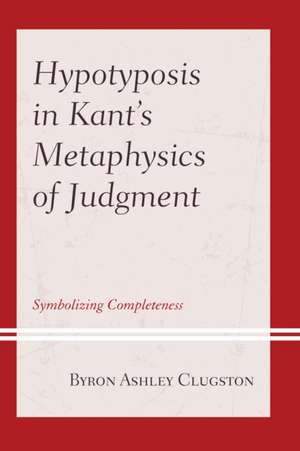Hypotyposis in Kant's Metaphysics of Judgment: Contemporary Studies in Idealism
Autor Byron Ashley Clugstonen Limba Engleză Hardback – 2 oct 2019
Preț: 607.69 lei
Preț vechi: 789.20 lei
-23% Nou
Puncte Express: 912
Preț estimativ în valută:
116.29€ • 120.15$ • 96.73£
116.29€ • 120.15$ • 96.73£
Carte tipărită la comandă
Livrare economică 19 martie-02 aprilie
Preluare comenzi: 021 569.72.76
Specificații
ISBN-13: 9781793605153
ISBN-10: 1793605157
Pagini: 154
Dimensiuni: 152 x 229 x 11 mm
Greutate: 0.39 kg
Editura: Rowman & Littlefield
Seria Contemporary Studies in Idealism
ISBN-10: 1793605157
Pagini: 154
Dimensiuni: 152 x 229 x 11 mm
Greutate: 0.39 kg
Editura: Rowman & Littlefield
Seria Contemporary Studies in Idealism
Notă biografică
Byron Ashley Clugston completed his PhD in philosophy at the University of Sydney.
Descriere
In demonstrating how much Kant's metaphysics of judgment relies on symbolism, this book clarifies Kant's relationship to Romanticism. This connection sets the stage for an argument against the rational/irrational dichotomy.








